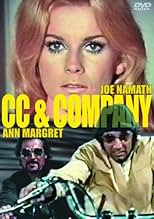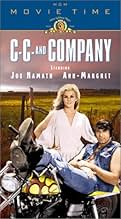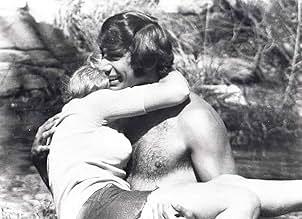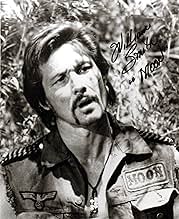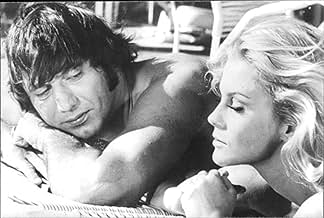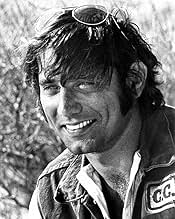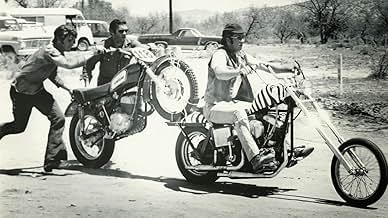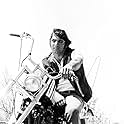IMDb-BEWERTUNG
4,8/10
1100
IHRE BEWERTUNG
Füge eine Handlung in deiner Sprache hinzuA motorcycle rebel saves a woman from his gang and fights an outlaw guru for supremacy.A motorcycle rebel saves a woman from his gang and fights an outlaw guru for supremacy.A motorcycle rebel saves a woman from his gang and fights an outlaw guru for supremacy.
Jacquie Rohr
- Zit-Zit
- (as Jackie Rohr)
Bill Baldwin
- Night Watchman
- (as William Baldwin)
Empfohlene Bewertungen
This is one of the best Biker-Movies ever. It has it all: heavy bikers, great action, good music, humor and a lot of sexy girls. Ann Margret and Jennifer Billingsley look really wonderful in their outfits. I think this was Joe Namaths film debut but the brilliant William Smith as Gangleader Moon steals everybody in the show. If you are a fan of those kind of movies, don't miss it!
Largely forgotten now, this movie was viewed by a lot of people in the 1970s. Parents saw it, mainly for Ann Margeret, in movie theaters during its 1st run, older kids caught it, mainly for Joe Namath, during its drive-in run and all us youngsters saw it when it made it's way to TV in the mid-1970s. I remember it fondly.
A product of a by gone era, it's really not as bad as some have made it out to be. Worth it for the novelty of Joe Namath and the 1970s cheese factor alone. Broadway Joe isn't really half bad because he did have tremendous charisma and a screen presence which somewhat compensates for his lack of acting chops. Plus as his adversary, we have quintessential 1970s bad guy, William Smith (the unforgettable Falconetti from Rich Man, Poor Man mini series or bad-ass Jack Wilson in Clint Eastwood's Any Which Way You Can) who turns in a fine performance. Throw in Sid Haig, Crispin Glover's father Bruce (of Diamond's Are Forever fame) and a delightfully campy performance from Teda Bracci and you have a pretty memorable Biker gang.
I wonder if Ann Margret and her husband originally thought of Elvis for the title role because this film is similar to many of his mid-sixties on screen personas (misunderstood rebel woos wary girl, defeats opposition in race at end). Fortunately for Elvis, his career, unlike Miss Margret's at the time, had just been spectacularly reignited with his TV Comeback Special and Vegas headlining. Anyway, Ann always possessed a great screen presence of her own; enough, along with all the outdoor scenery, to keep the viewer interested.
I think if you take this movie for what it is, a mindless artifact of late 1960s/early 1970s culture starring one of that era's biggest icons, you won't regret having spent 90 mins. watching it on a dreary Saturday afternoon.
A product of a by gone era, it's really not as bad as some have made it out to be. Worth it for the novelty of Joe Namath and the 1970s cheese factor alone. Broadway Joe isn't really half bad because he did have tremendous charisma and a screen presence which somewhat compensates for his lack of acting chops. Plus as his adversary, we have quintessential 1970s bad guy, William Smith (the unforgettable Falconetti from Rich Man, Poor Man mini series or bad-ass Jack Wilson in Clint Eastwood's Any Which Way You Can) who turns in a fine performance. Throw in Sid Haig, Crispin Glover's father Bruce (of Diamond's Are Forever fame) and a delightfully campy performance from Teda Bracci and you have a pretty memorable Biker gang.
I wonder if Ann Margret and her husband originally thought of Elvis for the title role because this film is similar to many of his mid-sixties on screen personas (misunderstood rebel woos wary girl, defeats opposition in race at end). Fortunately for Elvis, his career, unlike Miss Margret's at the time, had just been spectacularly reignited with his TV Comeback Special and Vegas headlining. Anyway, Ann always possessed a great screen presence of her own; enough, along with all the outdoor scenery, to keep the viewer interested.
I think if you take this movie for what it is, a mindless artifact of late 1960s/early 1970s culture starring one of that era's biggest icons, you won't regret having spent 90 mins. watching it on a dreary Saturday afternoon.
Although Ann-Margret is gorgeous as always, Joe Namath cannot carry a suitcase, let alone a movie. I loved him as a quarterback, ...BUT, except for his horrendous performance in NORWOOD with Glen Campbell, he just doesn't have it. Thank God, William Smith (fine actor) has plenty of scenes with Joe and Ann-Margret.
A 4 out of 10. Best performance = Mr. Smith. Exchanging furtive glances, Mr. Namath and Ann simply look foolish, although there are great location shots..I believe in the Southwest. Pure exploitation but just not enough fun, skin, plot, or talent. Ann has a great hairstyle though in 1970!
A 4 out of 10. Best performance = Mr. Smith. Exchanging furtive glances, Mr. Namath and Ann simply look foolish, although there are great location shots..I believe in the Southwest. Pure exploitation but just not enough fun, skin, plot, or talent. Ann has a great hairstyle though in 1970!
C.C. Ryder (Joe Namath), a motorcycle mechanic, is a somewhat reluctant member of an outlaw biker gang known as The Head. By accident, he meets a fashion photographer, Ann McCalley (Ann-Margret), and saves her from the other members of his gang. C.C. falls for Ann, but realizes he'll have to leave the gang if he is to win her over. C.C. enters and wins a dirt bike race, giving him the funds he needs to strike out on his own and pursue Ann. But gang leader Moon (William Smith) doesn't see it that way. He wants C.C.'s money for his own and goes after Ann to prove his point. C.C. will have to defeat Moon if he is to be free of The Head.
Given its relatively poor online reputation, I'm as shocked as anyone by how much I enjoyed C.C. and Company. The movie just clicked with me and worked quite nicely. Director Seymour Robbie may have been mainly a television director, but I felt he handled this transition to film very professionally. C.C. and Company is well-paced with plenty of sight gags and fight scenes that work as intended. For example, the scene where C.C. steals the dirt bike is really cleverly handled. The shot of him towing the dirt bike behind his chopper was a real kick. As for fight scenes, the fight between C.C. and Moon in the creek is really well choreographed and filmed. It's a solid action piece. Robbie also manages to throw in some menacing set-pieces, none more so than the kidnap of Ann. Again, nicely done.
The acting in C.C. and Company is also a highlight. I wasn't expecting much from Namath, but he gives a reasonably competent performance. In a lot of scenes he's not asked to do much more than sit on his bike and smile, but when challenged, he's more than capable. Ann-Margret is Ann-Margret and gives the performance you expect. The chemistry she had with Namath seemed natural and easy. The real star for me, however, is William Smith. He plays Moon as a hulking, menacing presence capable of snapping at a moment's notice. He's always struck me as a wonderful actor and, here, he really gets a chance to shine.
As I said near the start of this, I enjoyed C.C. and Company more than most. I was entertained throughout and that's all I ask of a film. A solid 7/10 from me.
Given its relatively poor online reputation, I'm as shocked as anyone by how much I enjoyed C.C. and Company. The movie just clicked with me and worked quite nicely. Director Seymour Robbie may have been mainly a television director, but I felt he handled this transition to film very professionally. C.C. and Company is well-paced with plenty of sight gags and fight scenes that work as intended. For example, the scene where C.C. steals the dirt bike is really cleverly handled. The shot of him towing the dirt bike behind his chopper was a real kick. As for fight scenes, the fight between C.C. and Moon in the creek is really well choreographed and filmed. It's a solid action piece. Robbie also manages to throw in some menacing set-pieces, none more so than the kidnap of Ann. Again, nicely done.
The acting in C.C. and Company is also a highlight. I wasn't expecting much from Namath, but he gives a reasonably competent performance. In a lot of scenes he's not asked to do much more than sit on his bike and smile, but when challenged, he's more than capable. Ann-Margret is Ann-Margret and gives the performance you expect. The chemistry she had with Namath seemed natural and easy. The real star for me, however, is William Smith. He plays Moon as a hulking, menacing presence capable of snapping at a moment's notice. He's always struck me as a wonderful actor and, here, he really gets a chance to shine.
As I said near the start of this, I enjoyed C.C. and Company more than most. I was entertained throughout and that's all I ask of a film. A solid 7/10 from me.
I'm not an American, but I'm well aware of Joe Namath being a sporting legend. However, as an actor he stinks. He's very wooden and lacks charisma, and whoever decided to cast him as a biker was an idiot. Namath plays C.C. Ryder, a nice guy mechanic who runs with a biker gang "The Heads", led by Moon (biker movie legend William Smith). While he is accepted by most of the gang, he has an easy relationship with Moon, and once he becomes involved with a "straight" fashion reporter (Ann-Margaret) tensions mount, leading to a kidnapping. Namath as I said is lousy, and as 90% of the movie focuses on him, it makes it hard to stay interested. But Ann-Margaret is a babe, and even better William Smith is terrific. Smith plays a great bad ass, it's just a pity there wasn't more of him in the movie. As well as Smith watch 'C.C. and Company' to see Sid Haig and Bruce Glover as two of Smith's biker pals. These three talented character actors save the movie from being a complete turkey.
Wusstest du schon
- WissenswertesThe #12 given to Joe Namath ("CC") for the Moto X Race is the same number he wore on his jersey with the NY Jets.
- PatzerIn a scene where C.C. kicks starts his dirt bike you hear the engine rev-up but his hand never moves the throttle.
- Zitate
Ann McCalley: How do you get along without working?
C.C. Ryder: Just fine.
Ann McCalley: [laughs] You steal from the rich to give to the poor?
C.C. Ryder: No, I steal from the rich 'cause the poor have no money.
- VerbindungenFeatured in The Fabulous Allan Carr (2017)
- SoundtracksToday
The Love Theme from Höllenengel und Company (1970)
by Lenny Stack and Janelle Webb (as Janelle Cohen)
Sung by Ann-Margret
Top-Auswahl
Melde dich zum Bewerten an und greife auf die Watchlist für personalisierte Empfehlungen zu.
- How long is C.C. & Company?Powered by Alexa
Details
Zu dieser Seite beitragen
Bearbeitung vorschlagen oder fehlenden Inhalt hinzufügen

Oberste Lücke
By what name was Höllenengel und Company (1970) officially released in India in English?
Antwort

